2010 年陕西省安康中考英语真题及答案
第Ⅰ卷(共 70 分)
听力部分
Ⅰ. 听句子,选答语(共 5 小题,计 5 分)
本题共有 5 个小题,每个小题你将听到一句话,读两遍,请从所给的三个选项中选出一
个最恰当的答语。
1. A. Yes, it is.
2. A. It’s sunny.
3. A. I’m listening to music.
4. A. Good idea.
5. A. So am I.
Ⅱ. 听对话,选答案
C. No, it isn’t.
B. Thank you.
B. It’s Monday.
C. It’s June 27.
B. I was doing some reading.C. I watched TV.
B. By bike.
B. So is it.
C. Enjoy yourself.
C. So it is.
本题共有 10 个小题,每个小题有一段对话和一个问题,读两遍,请根据每段对话的内
容和后面的问题,从所给的三个选项中选出最恰当的一项。
6. A. In the library.
7. A. Noodles.
8. A. 12.
B. In the restaurant.
B. Dumplings.
B. 14.
C. In the shop.
C. Rice.
C. 16.
9. A.
B.
C.
B. Jim’s mother.
B. Far from the park.
10. A. Jim.
11. A. Next to the park.
park/
12. A. Once.
13. A. In a TV station.
14. A. To do homework.
15. A. To say goodbye to Linda. B. To work here.
Ⅲ. 听短文,选答案
B. Twice.
B. In a bank.
B. To play the piano.
C. Jim’s teacher.
C. Across from the
C. Three times.
C. In a factory.
C. To play chess.
C. To enjoy himself.
本题你将听到一篇短文,读两遍,请从给每个小题的三个选项中, 选出一个正确答案。
16. What color is Curly?
A. Brown.
B. Black.
C. Blue.
17. Curly likes running and playing with _____.
A. the writer’s father
B. the writer
C. another dog
18. One day the writer’s father took off his coat and asked Curly to _____.
C. look after it
A. carry it
B. play with it
19. Where did the writer’s father put his coat?
A. Under the tree.
B. In the tree.
C. On Curly’s back.
20. Why didn’t Curly come when the writer called him late in the evening?
A. Because he was afraid of the writer.
B. Because he was sleeping on the coat.
C. Because he was watching the coat.
�
笔试部分
Ⅰ. 单项选择 (共 10 小题,计 10 分)
本题共有 10 个小题,请从每个小题的四个选项中,选出一个最佳答案。
21. This is _____ classroom, but where is ours?
A. they
B. them
C. their
D. theirs
22. Hi, Jack. Would you please _____ the picture on the wall?
A. pick up
C. get up
23. Sometimes it rains _____ in Xi’an in summer.
B. look up
D. put up
A. heavy
B. heavily
C. strong
D. strongly
24. I hear Tom lives here, but I’m not sure _____.
A. which room he lives in
C. he lives in which room
B. which room does he live in
D. in which room does he live
25. Don’t forget _____ an umbrella _____ you. It’s going to rain.
A. to take; to
B. taking; to
C. to take; with
D. taking; with
26. —Must I finish my homework at school?
—No, you _____. You can do it at home.
A. can’t
27. Be careful, _____ you’ll miss the right answer.
C. needn’t
B. mustn’t
D. won’t
A. and
B. or
C. but
D. so
28. It’s too bright and sunny. Why not _____ your sun glasses?
D. wear
A. break
B. clean
C. make
29. The _____ friends you have, the _____ you will be.
A. more; happy
B. many; happy
C. more; happier
D. many; happier
30. —Do you know the boy over there?
—Sure. I _____ him for years.
A. knew
Ⅱ. 完形填空(共 10 小题,计 10 分)
B. will know
C. have known
D. known
阅读下面一篇短文,理解大意,然后从各个小题的四个选项中选出一个最佳答案,使短
文连贯完整。
One day before my final exam, my dad gave me a gift. It completely changed my
life.
33
31
32
On that day I had a
in my life—the fight, the sleepless nights and my poor health …
with my friends and it was a difficult time with my studies.
it and saw a DVD inside. Its name
I was unhappy. Then I noticed the gift. I
was “THE SECRET”. However, I was in no mood (心情) to watch it. I sat down to study,
but the
there was any.
Everything came to my mind. I wanted an answer but I wondered
Just then, I saw the DVD again. Maybe it would be helpful. I
my DVD player.
I had no words to describe the feelings I experienced while watching it. The moving
(感动人的) stories of human beings made me so moved that I wouldn’t
any of
them.
34
35
36
Thanks to my father’s gift “THE SECRET”, I discovered
difficulties in their lives. The important thing is that you should be
to face them. Now I have started
health, too. I often hear people say, “Wow! 40
39
37 . Everybody has
enough
my studies and my friends. And I’m in good
38
perfect life you have!”
�
B. party
B. kept
B. problems
B. that
B. looked for
B. forget
B. itself
B. brave
31. A. trip
32. A. opened
33. A. chances
34. A. why
35. A. turned on
36. A. report
37. A. yourself
38. A. mad
39. A. being busy with
C. getting on well with
40. A. What a
Ⅲ. 阅读理解 (共 15 小题,计 25 分)
B. worrying about
D.being afraid of
C. talk
C. moved
C. suggestions
C. if
C. put away
C. think
C. himself
C. sad
D. fight
D. broke
D. mistakes
D. how
D. paid for
D. remember
D. myself
D. weak
B. What
C. How a
D. How
A) 阅读下面一篇短文,判断下列句子是否符合短文内容,符合的用“A”表示,不符合的
用“B”表示。(共 5 小题,计 5 分)
A
Today more and more people are using refrigerators. Some are big, others are
small. Big ones have two or three doors. Such refrigerators can not only keep the
food cold and fresh, but also make ice and freeze the food. However, small ones
usually have one door and can only keep things cold and fresh.
There are also refrigerators that are friendly to the environment. In the 1970s,
the world was in energy crisis (危机). Refrigerators use too much energy. So people
began to think of ways to improve it. At last a kind of new refrigerators was made.
They use very little energy, but they’re too expensive. They cost twice or three
times more than the ones that we use at home. However, people believe they will be
cheaper and cheaper. As a result, they will be more and more popular.
In the future, there will be refrigerators that can do more than we can imagine.
They are called smart refrigerators (智能冰箱). They have tiny computers inside.,
with their screens on the door. They can show us what food is inside. They can also
tell us what food to buy. They can even let us know what food to eat then we input
the necessary health information. The more surprising thing is that they can do
shopping for us when they are connected (连接) to the supermarket.
41. Small refrigerators can not only keep the food cold but also freeze the food.
42. Refrigerators that use little energy are more expensive.
43. Friendly refrigerators will be popular some day.
44. Refrigerators that keep the food fresh are smart refrigerators.
45. We can have a “talk” with smart refrigerators.
B) 阅读 B、C 两部分内容,从各小题所给的四个选项中选出能回答所提问题或完成所给句子
的最佳答案。(共 10 小题,计 20 分)
B
Are you going to high school to go on with your study? What will you do if you
can’t? Don’t worry. Vocational (职业的) schools are open for you because our country
is in need of people with special skills.
Compared with common high schools, vocational schools have more advantages.
Firstly, in order to promote (促进) the development of vocational education, our
�
country spends a lot of money on it. So you need to pay only a smaller half of the
school fee (学费). Secondly, in here you have already started learning practical
skills that you can use all your life. But some other students may still worry about
how to spend the long three years at high schools. Why? Because they didn’t choose
the school that suits (适合) them. And finally, when they are still wondering where
to go, you are already able to live on your own hands proudly. And perhaps it won’
t be long before you are on the road to success.
People take different roads because they have different potentials (潜力). So
different students should choose different schools. Go to high school if you think
that you can go farther on that road. Choose a key high school if you are lucky enough
to have the chance. Enter a vocational school if you are interested in the lessons
there and you are better at making things with your hands.
In a word, think carefully and see what kind of person you are. Remember, always
B. useful
C. poor
D. safe
D. How to succeed.
B. How to learn a skill.
choose things that suit you.
46. What does the second paragraph talk about?
A. The future of vocational school.
C. The advantages of vocational schools.
47. The underlined word “practical” here means “_____”.
A. fair
48. Vocational school students can _____ than students who choose a high school
carelessly.
A. spend more money
C. get more
49. What can we learn from the passage?
A. People should take the same road.
B. Key high school students must be good at making things.
C. Clever students are better at using their hands.
D. We should choose things that suit us.
50. This passage is written to _____.
A. advise some students to choose vocational schools
B. talk about the advantages of common high schools
C. discuss how to divide students into different groups
D. compare different schools
C
B. be more worried
D. have fewer chances to succeed
SHANGHAI—Today there are more than 350,000 people visiting the Expo (世博会). The
French pavilion is still the hottest. Over 3,000 people are
waiting in line in front of it. The organizers suggest visitors
go to other pavilions first. In fact, pavilions of countries such
as Russia, Canada, Japan and America are all very good.
XI’AN—Today more than 2,000 people have written their names on a paper. They promise
to use less energy and live a low-carbon (低碳) life. Let’s follow them. Cut off
the power of your computer when you don’t use it. Turn off the lights when going
out. Use buses more. Share your cars with others. Eat less meat. Let’s do our best
to stop the earth from warming.
�
ANKANG—A taxi driver found a bag in his car this morning. There was 10,000 yuan
in it. The kind-hearted driver gave the bag to the police. The
police have now found the owner, a businessman from Baoji. To show
his thanks, the owner wanted to give him 500 yuan, but the driver
didn’t take it. He says it is something that any taxi driver will
do.
XINING—A special train is now leaving Xining for Shanghai. It
carries the last 300 Tibetan children. The platform is crowded with
people. Most of them are parents. These children will study in some
famous schools in Shanghai until they finish high school. Those
schools will pay all their expenses (费用). The children will also get 100 yuan as
pocket money each month. Many parents ask us to give their thanks to the Party.
B. Russian
D. Japanese
B. Always keep the lights on.
D. Eat less meat.
D. A Kind Reporter
B. An Honest Taxi Driver
51. It is clear that people are more interested in the _____ pavilion.
A. French
C. Canadian
52. Which of the following is a way of low-carbon life?
A. Never turn off your computer.
C. Always drive to work.
53. The headline (标题) of the third news should be _____.
A. A Good Policeman
C. A Careless Businessman
54. The fourth news says that _____.
A. the children will get 100 yuan from their parents each month
B. there are only parents at the station
C. all the children will go to the same school
D. the parents are very thankful
55. Which of the following is TRUE according to the news?
A. The American pavilion is the most popular.
B. The readers are asked not to share their cars with others.
C. The government takes good care of the Tibetan children.
D. The taxi driver took the 500 yuan.
第Ⅱ卷(共 50 分)
Ⅳ. 完成句子(共 10 小题,计 10 分)
用所给单词的适当形式完成下列句子。
1. Lots of _____ (foreign) come to visit the old town every year.
2. Don’t mind _____ (offer) your help to others when necessary.
3. He works in the _____ (big) computer company in the world.
4. There are _____ (hundred) of people dancing at the square after supper.
5. My mother was _____ (water) flowers in the garden when I came back.
6. She is proud of _____ (she) for not giving up easily.
7. The boy sat down excitedly because he answered the difficult question _____
(correct).
8. Everybody likes to ask him for help because he often _____ (come) up with good
ideas.
9. It is a good habit to brush your _____ (tooth) after each meal.
�
10. Many school things were _____ (send) to Yushu last month.
Ⅴ. 任务型阅读(共 10 小题,计 15 分)
A)阅读下面短文,根据短文内容,完成下列各题。(共 5 小题,计 10 分)
David is in his school curling (冰壶运动) team in Scotland. He also plays for
two clubs. Let’s listen to his story and learn more about curling.
“I first started playing four years ago when I was 10 years old. My father,
mo brother and sister all curl and I would go and watch them play. I enjoy curling
because I like the feeling of playing on real ice. I also like it because it is
mentally challenging (智力挑战). In the play, you have to think about how to achieve
your goal and how to beat the other team.”
“Sweeping (清扫冰道) is probably the most difficult par r of the game. It is
very important because this decides the speed of the stone and keeps it straight.”
“Games can go on for three or four hours and I play about three times a week.
Some of my friends thought it was funny when I started curling. The they tried it
and now they play it, too.”
“Curling has been a Winter Olympic game since 1998. I would like to play at
the Winter Olympics in the future. I would surely recommend (推荐) curling to
everyone, because it’s different from other sports.”
1. David plays for _____ and _____ in Scotland.
2. He enjoys curling because he likes _____ on real ice and it’s also _____.
3. The most difficult part of the game must be _____.
4. A curling game can go on for _____.
5. The reason for recommending curling to others is that it’s _____.
B)阅读下面短文, 将方框内所给句子抄写在短文的适当位置,使短文意思完整。(筒
5 小题,计 5 分)
In cities in the USA, there are clocks in most stores, factories, and other
buildings. Radio announcers (广播员) give the correct time during the day. 6.
They want to do certain things at certain times. They don’t want to be late.
But time is not so important to people everywhere. 7.
You
will find that people living there do not like to rush. If you have an appointment
(约会) with some friends, they will probably be late. 8.
Even
the radio programs may not begin on time. 9.
In South America, many people think of a clock as a machine. 10.
They don’t want a clock or any machine to affect (影响) their lives so much.
Suppose you visit a country in South America.
They say if people do everything on time, they are letting clocks control (控
制) their lives.
People there think that it is important to know the time.
The radio announcers don’t think it is important to announce the exact time.
They don’t want to arrive on time.
Ⅵ. 补全对话(共 10 小题,计 10 分)
A)根据对话内容,将方框内符合对话情景的句子抄写在对话空白处,使对话恢复完整,
选项中有两项是多余的。
A: Hi, Wang Lin. Did you see the 8 o’clock program of CCTV 1 last night?
�
B: No. 1.
A: About environment protection. It tells us some goof ways.
B: 2.
A: Well, we can start by saving water in our daily life.
B: Yes. 3.
A: And we’d better not use plastic bags, either.
B: Good idea. 4.
A: We can also save paper. 5.
B: Right! Everyone can do something to protect our environment.
I don’t like it.
What else?
What’s it about?
After washing things, we can use the eater to do something else.
Plastic bags are useful.
What can we do?
Making paper needs many trees.
B)根据下面对话中的情景,在每个空白处填入一个适当的语句,是对话恢复完整。
?
A: Hello! Jane speaking. 6.
B: This is Mrs. Brown. You didn’t come to school this morning.
7.
A: Sorry, I forgot to ask for leave. I feel terrible. I can’t fall asleep these
days.
B: 8.
A: I keep thinking about the coming exam.
B: 9.
Listen to some music and do some sports.
A: 10.
B: I hope you will be better soon. Bye.
A: Goodbye.
Ⅶ. 书面表达(共 1 题,计 15 分)
. I’m sure you can do it quite well. Try to relax yourself.
. But how is that?
?
.
假如你是李林,你的美国笔友 Sam 要来你的家乡,恰巧你不在,你想介绍一位与 Sam
志趣相投的同学刘凯接待他。请参考下表中 Sam 的相关信息,用英语写一份邮件,说明刘
凯的情况。
Age
Hobbies
Personality (性
格)
Other
information
16
sports, music, traveling …
honest, friendly, helpful …
want to learn Chinese, like Chinese culture …
要求: 1. 语句通顺,意思连贯,书写工整;
2. 文中不得出现真实地名;
3. 词数:60-80 词(邮件的开头和结尾已给出,但不计入总词数)。
�
参考答案:
1-5 BABAC
21-25 CDBAC
41-45 BAABA
Ⅳ. 1. foreigners
5. watering
9. teeth
6-10 CBACC
26-30 CBDCC
46-50 CBCDA
11-15 ABBCA
31-35 DABCA
51-55 ADBDC
16-20 BBCAC
36-40 BDBCA
2. offering
6. herself
10. sent
3. biggest
7. correctly
4. hundreds
8. comes
Ⅴ. 1. two clubs / his school (curling) team, his school (curling) team / two clubs
2. the feeling of playing, mentally challenging
3. sweeping
4. three or four hours
5. different (from other sports)
6. People there think that it is important to know the time.
7. Suppose you visit a country in South America.
8. They don’t want to arrive on time.
9. The radio announcers don’t think it is important to announce the exact time.
10. They say if people do everything on time, they are letting clocks control (控
制) their lives.
Ⅵ. 1. What’s it about?
2. What can we do?
3. After washing things, we can use the water to do something else.
4. What else?
5. Making paper needs many trees.
6. Who’s that (speaking)
7. What’s wrong (with you) / What’s the matter (with you) / What’s the trouble
(with you) / What’s your trouble / Why / Why didn’t you come to school / What was
wrong (with you) / What (has) happened
8. I’m sorry to hear that / Sorry to hear that
9. Don’t worry / Don’t be nervous
10. Thank you very much / Thanks a lot / Thanks (very much) / It’s very kind
of you
附:
听力文稿
Ⅰ. 听句子,选答语
本题共有 5 个小题,每个小题你将听到一句话,读两遍,请从所给的三个选项中选出一
个最恰当的答语。
1. Your English is so good.
2. How is the weather today?
3. What were you doing at 9:00 yesterday evening?
4. Why not go fishing this weekend?
5. Xi’an is a city with a long history.
Ⅱ. 听对话,选答案
本题共有 10 个小题,每个小题有一段对话和一个问题,读两遍,请根据每段对话的内
�
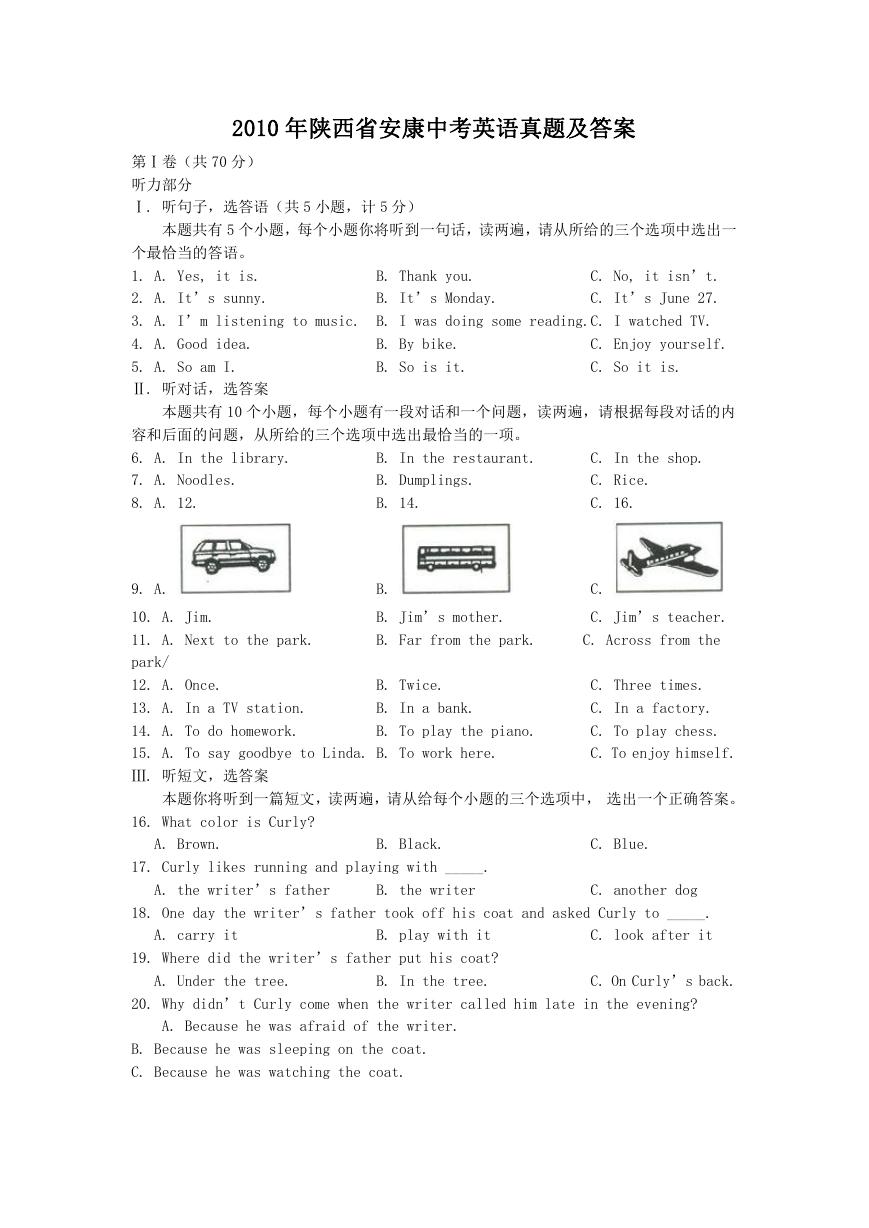
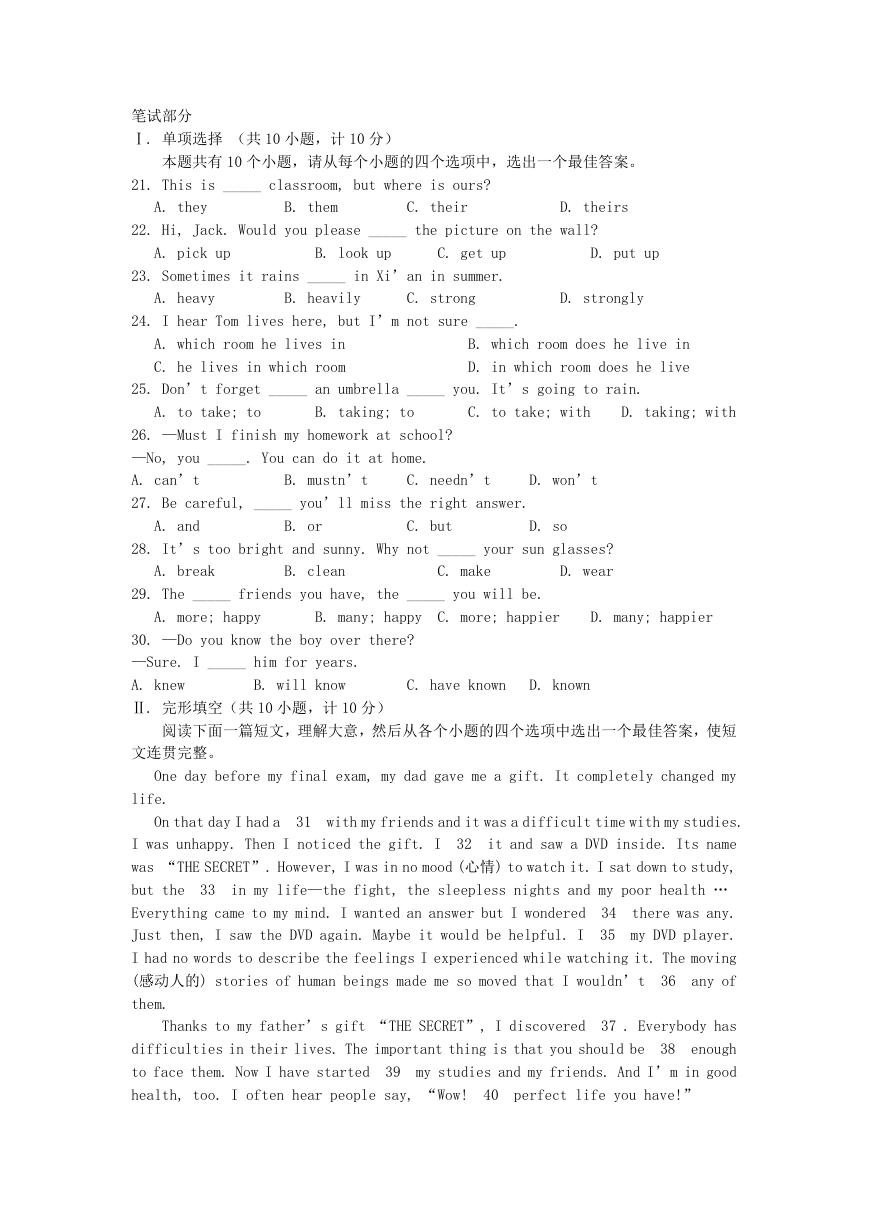

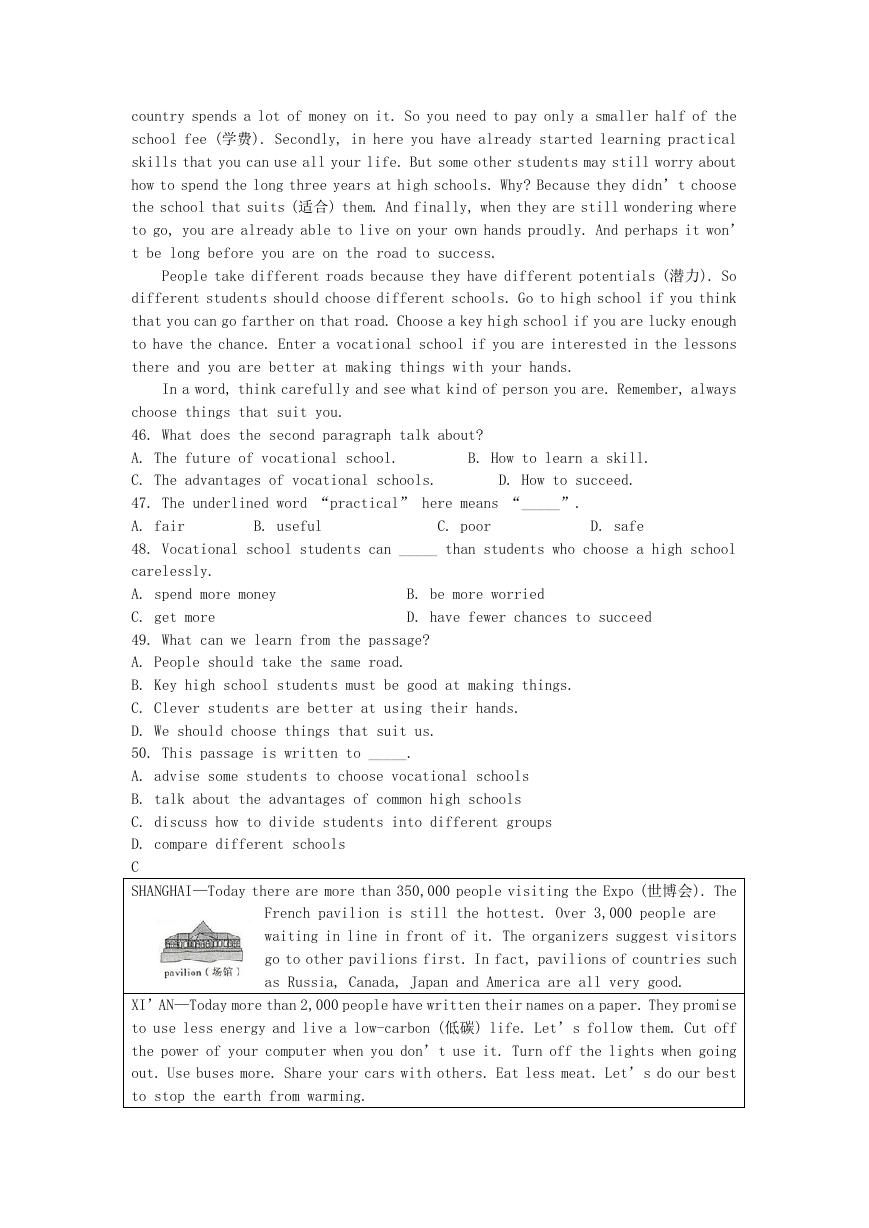
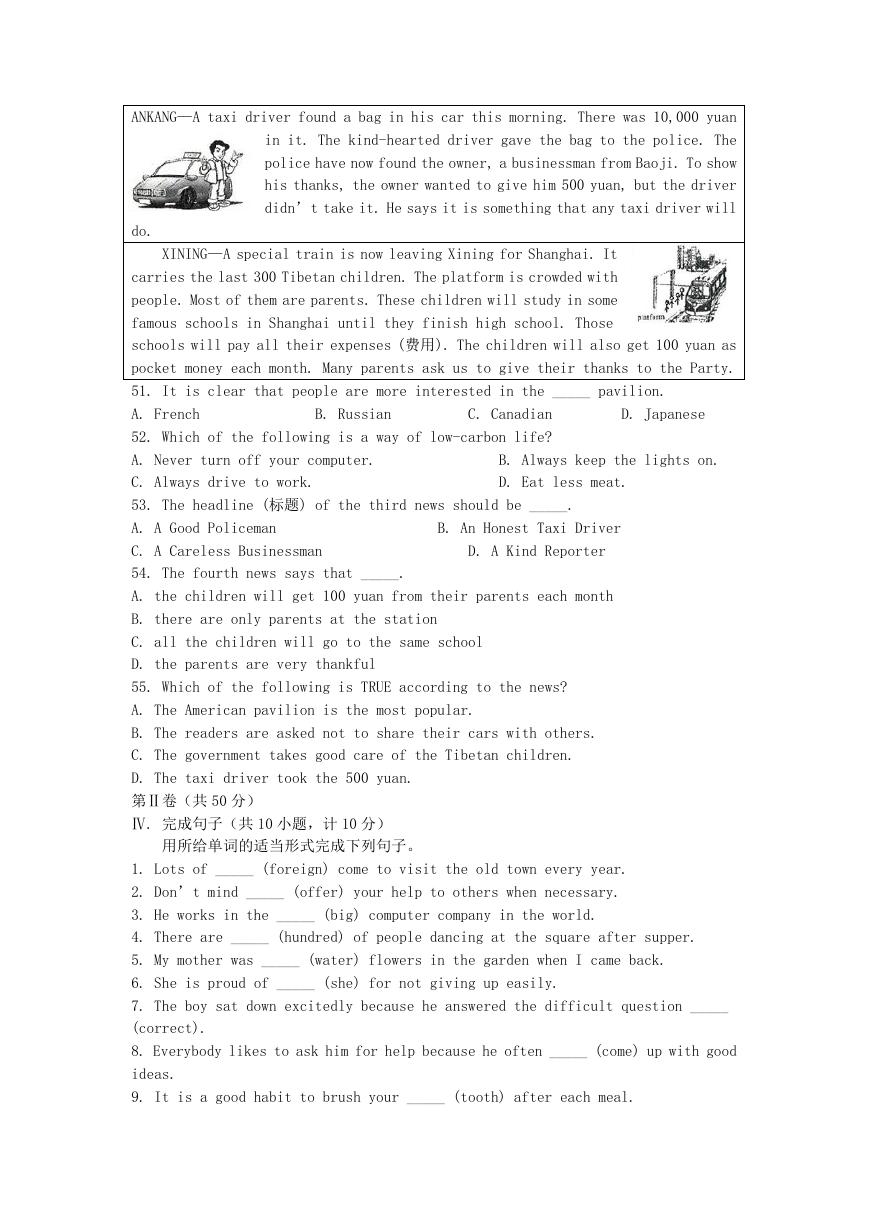
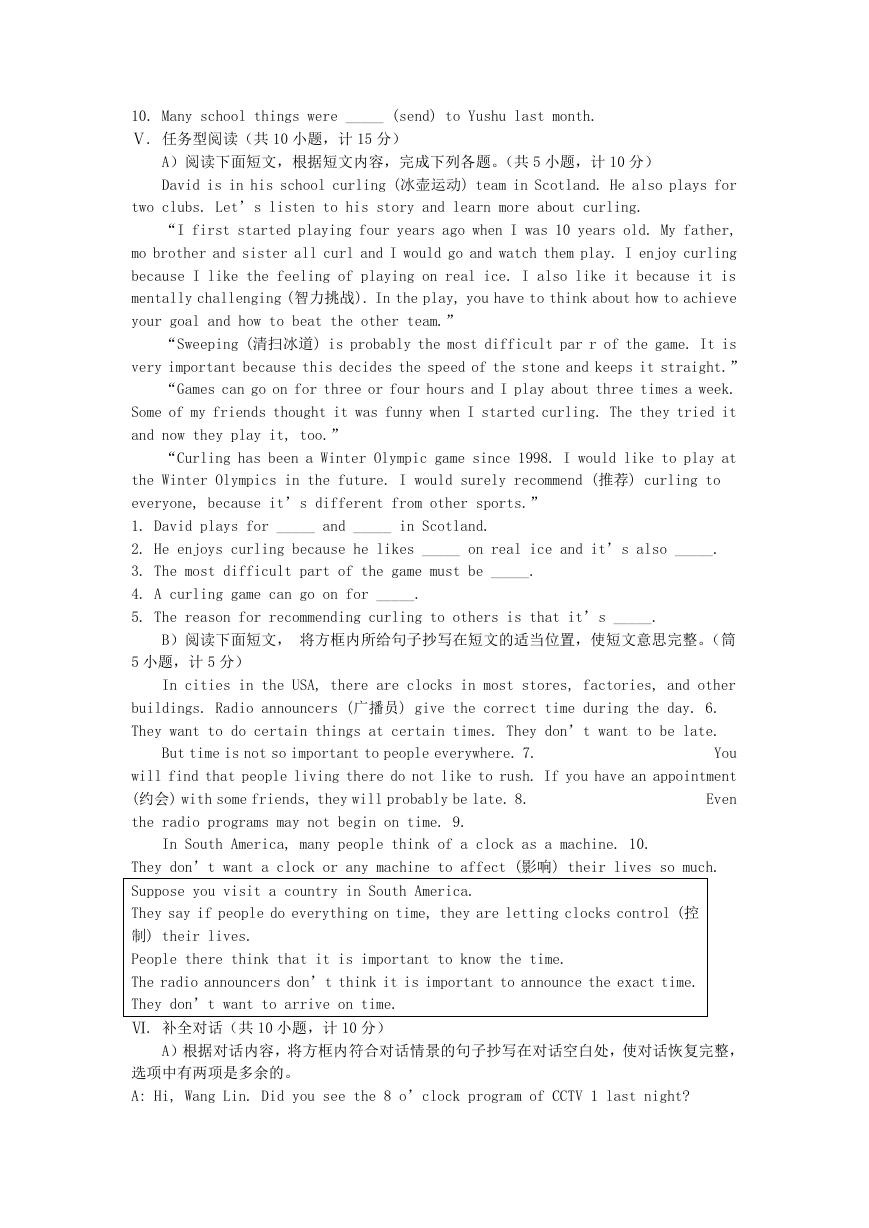
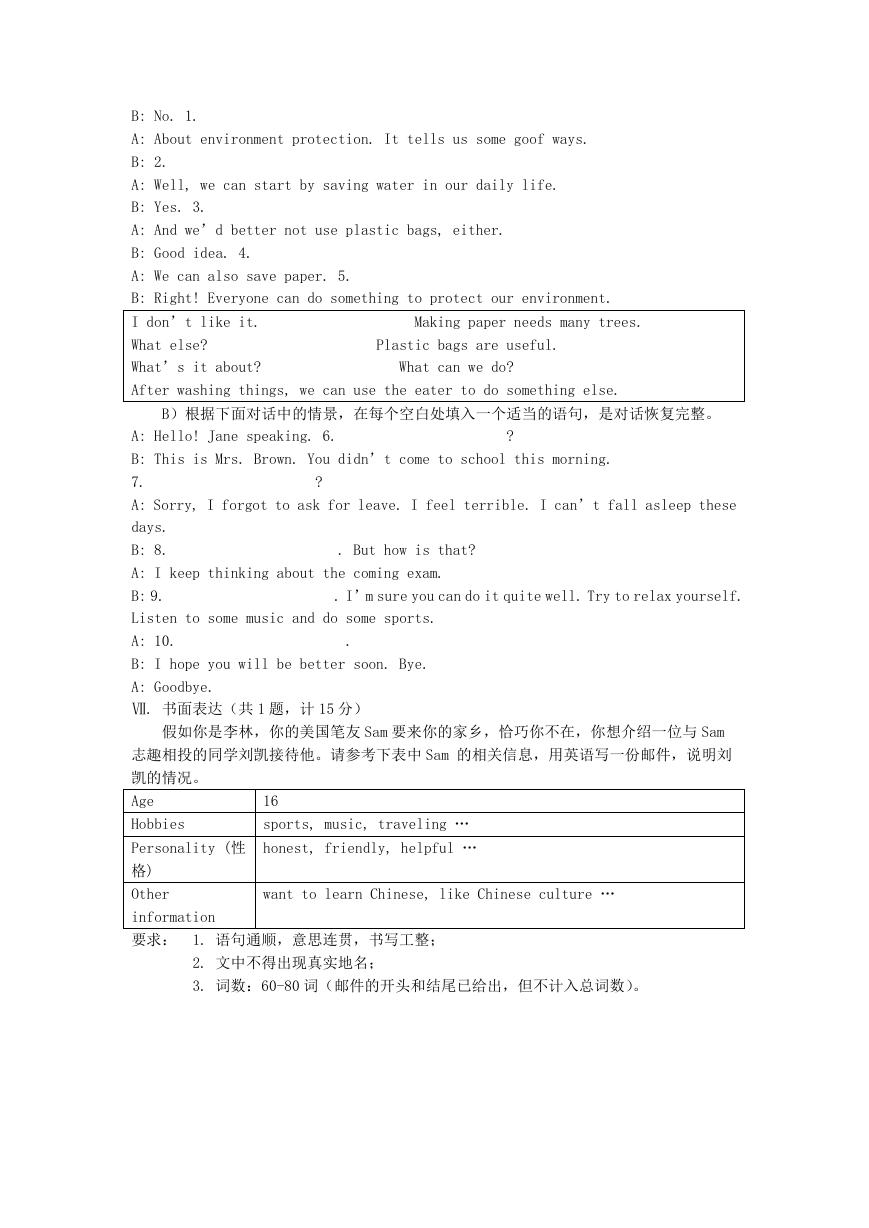
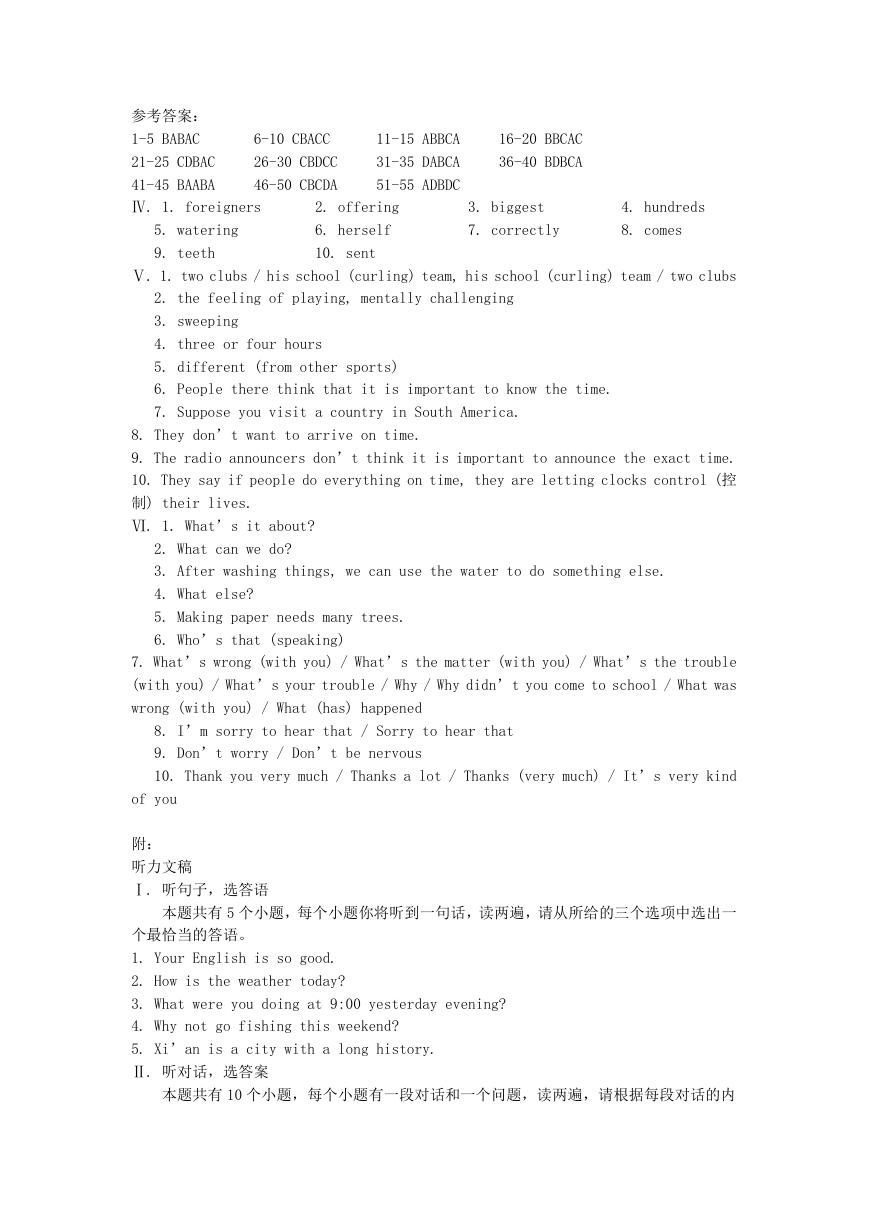








 2023年江西萍乡中考道德与法治真题及答案.doc
2023年江西萍乡中考道德与法治真题及答案.doc 2012年重庆南川中考生物真题及答案.doc
2012年重庆南川中考生物真题及答案.doc 2013年江西师范大学地理学综合及文艺理论基础考研真题.doc
2013年江西师范大学地理学综合及文艺理论基础考研真题.doc 2020年四川甘孜小升初语文真题及答案I卷.doc
2020年四川甘孜小升初语文真题及答案I卷.doc 2020年注册岩土工程师专业基础考试真题及答案.doc
2020年注册岩土工程师专业基础考试真题及答案.doc 2023-2024学年福建省厦门市九年级上学期数学月考试题及答案.doc
2023-2024学年福建省厦门市九年级上学期数学月考试题及答案.doc 2021-2022学年辽宁省沈阳市大东区九年级上学期语文期末试题及答案.doc
2021-2022学年辽宁省沈阳市大东区九年级上学期语文期末试题及答案.doc 2022-2023学年北京东城区初三第一学期物理期末试卷及答案.doc
2022-2023学年北京东城区初三第一学期物理期末试卷及答案.doc 2018上半年江西教师资格初中地理学科知识与教学能力真题及答案.doc
2018上半年江西教师资格初中地理学科知识与教学能力真题及答案.doc 2012年河北国家公务员申论考试真题及答案-省级.doc
2012年河北国家公务员申论考试真题及答案-省级.doc 2020-2021学年江苏省扬州市江都区邵樊片九年级上学期数学第一次质量检测试题及答案.doc
2020-2021学年江苏省扬州市江都区邵樊片九年级上学期数学第一次质量检测试题及答案.doc 2022下半年黑龙江教师资格证中学综合素质真题及答案.doc
2022下半年黑龙江教师资格证中学综合素质真题及答案.doc